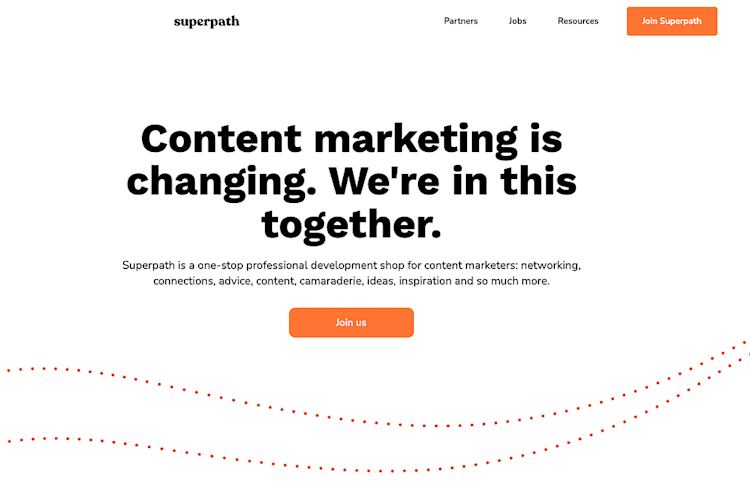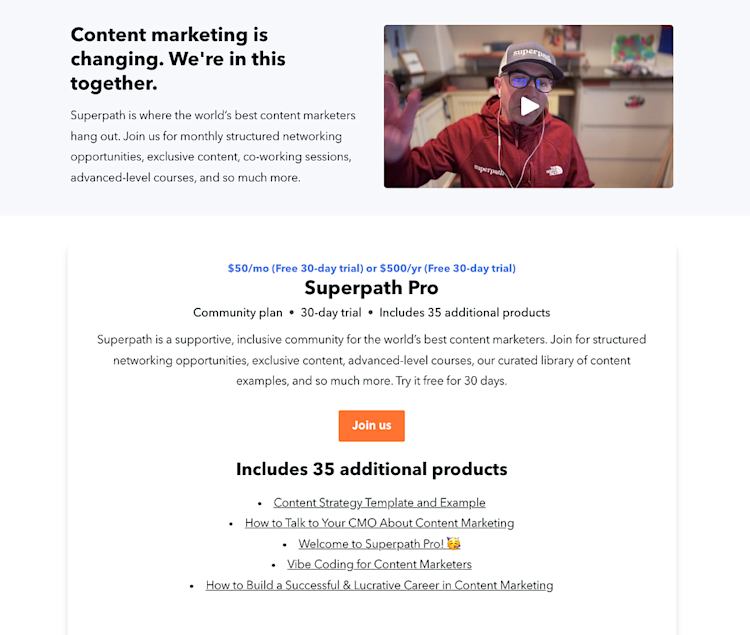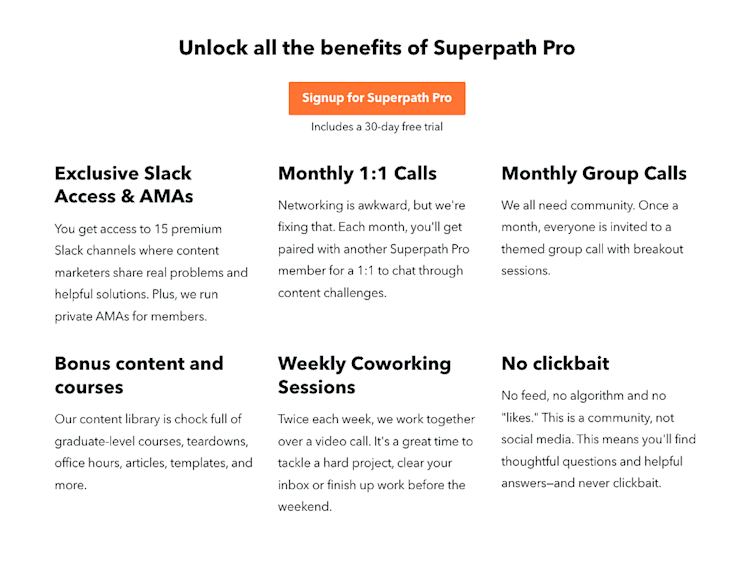When Jimmy Daly left his job in 2020, he had a new mortgage, a baby on the way, and a clear goal: turn a side project Slack group into a sustainable, profitable business in one year.
Five years later, Superpath is a thriving community membership for content marketers, with three core revenue streams and a lean team powered by simple tools.
All that happened because Jimmy took a big leap, scaled back when needed, and thought like an entrepreneur, which ultimately shaped every part of how he built and rebuilt his business.
Here’s how he did it.
From side project to profitable business in one year
Superpath began as a simple Slack group for content marketers. Jimmy had been working in business-to-business content marketing for over a decade, and he knew that content marketers craved real connections, community, and professional development opportunities.
So he created Superpath, a space where they could talk shop, solve problems, and build skills to use in their careers. He didn’t try to monetize it immediately, but he knew the idea had legs if he could commit to building it full time.
His boss at the time agreed and became an early investor in the project. When Jimmy left his job, he and his former boss made a funding agreement that included one year of salary and basic expenses — just Podia, Slack, and a few other tools to keep things running.

“The goal was really to find out, is this a business? Can we get this profitable?” Jimmy shares, “We capped it at one year. We had to be profitable because there was no more funding after that.”
Giving the project a hard deadline forced Jimmy to go all in and take it seriously. With no plan B and a one-year runway, Jimmy’s goal was to find out if this idea had the potential he thought it did.
Before launching Superpath, Jimmy grew his audience
Jimmy brought a rare combo of skills to the table: content marketing, sales, and a deep understanding of his audience. And he didn’t just know his target audience — he was part of it too.
Over the years, he had built a following of the very people Superpath was made for. He published blog posts, created content for his work, shared personal projects, and nurtured his professional network, long before the community was a thing.
When he launched Superpath, he wasn’t starting from scratch because he brought his audience along with him.
In a blog post about the early days of Superpath, Jimmy talks about how his existing social media and email newsletter subscribers became some of his first paying customers.
He explains,
“When it came time to launch Superpath, I created a ‘coming soon’ page and shared it with my Twitter followers and newsletter subscribers. Within a few days, 195 people had signed up to learn more. A handful of those people ended up being our first paying customers. It was the little bit of momentum I needed to start stacking wins. It would have been so much harder to start without an audience.”
That early momentum helped Jimmy keep going, and it all started because he showed up for his audience before the product was even ready.
This is something you can do in your business, too.
If you start sharing what you know and establishing yourself as an expert, you’ll already have a built-in group of people listening when your idea comes to life.
No matter what stage you’re at today, building an audience will make the steps you take tomorrow easier and more effective, and could even bring you your first buyers like it did for Superpath.
Keeping things simple on purpose
Another thing that made Superpath successful early on was that Jimmy kept the business simple.
From the beginning, it ran on a small, efficient tech stack:
-
Slack for the community
-
Podia for payments and hosting the courses and content that members get with their subscription
The business model was simple, too. Superpath earns revenue through paid community memberships, sponsorships with brands, and a writers marketplace where freelance content marketers and hiring companies can connect.
Each of these income streams makes up about a third of Superpath’s revenue and is tied directly to the community’s needs, which helps keep operations focused and overhead low.

“Our business is lean. We’re able to run it with a small team because we keep things simple and focused,” Jimmy explains.
That simplicity meant less time managing clunky systems or paying for tools that just created more work. And with lower monthly costs, it wasn’t such an uphill climb to hit that profitability mark within the year.
But growth brings challenges, too. And in 2023, Superpath hit a major one.
Scaling back to move forward
By 2023, Superpath had started to grow a team and expand, but economic uncertainty and the rise of AI tools like ChatGPT hit the business hard. Superpath’s revenue fell, and Jimmy had to lay off his one full-time employee.
To save money, he scaled back operations even further and had to take a critical look at every part of the business to decide what could stay and what had to go.
“2023 was a really difficult year. I had to face the very realistic scenario that this is over if I don’t fix it,” Jimmy shares.
“But the silver lining is that the business became better. Simpler. More aligned with our customers. I’m not wasting time on things that don’t work.”
That mindset still guides Jimmy today.
Until recently, Superpath had both a free and a paid version of the community. The free Slack group had grown to over 24,000 members, which is an amazing accomplishment, but it was challenging to manage.
On top of that, free members weren’t converting to paid plans as often as Jimmy hoped, so he had to make a difficult decision to get rid of the free community tier.
“We were too small a team to manage two communities. We needed to focus on making one the absolute best experience possible.”

Although closing down a large community is never easy, it was the right choice for the Superpath business because it allowed Jimmy to focus his time and resources on his paying customers.
Letting go of what wasn’t working made space to double down on what was.
Building a business that fits your life
Jimmy now runs the business with help from a few contractors, but the tools and systems behind Superpath have stayed simple, even five years later. And that’s the point. The business was designed to support his life, not take it over.
“One of the things that I wrote down as I was putting together a very, very rough business plan for this community is that I wanted it to be sustainable over time. Obviously, this was not meant to be a giant, fast-growing venture-backed startup. It’s not that, it’s me,” he explains.
To be sustainable, Superpath needed to work with Jimmy’s lifestyle so he could actually keep building it without burning out.
“I had a kid on the way, and I’ve had another kid since then. I have a lot of hobbies,” he shares. “I live in Colorado, so I love to go trail running, skiing, and camping. Running the business had to work well for me, it had to support the family, and I needed to enjoy it.”
A business that drains you isn’t going to last. The whole point is to create something you actually want to wake up and work on.
“I think that’s what I’m most proud of,” he reflects. “Here I am, still going five years later. And I think that’s a huge win that I’ve been able to create this thing that supports my life and my ambitions in a couple of different ways.”
Keeping the business simple, with just a few income streams, basic tools, and a small team, helps keep costs and complexity low. That gives Jimmy more time, flexibility, and control over how he works. He’s not running a startup chasing mindless exponential growth. From day one, he built Superpath to last.
Committing like an entrepreneur
In addition to keeping the business simple and focused on serving his audience, part of why Superpath has been so successful is that Jimmy doesn’t just think of himself as a content creator — he’s a business owner too.
“Think of yourself as an entrepreneur,” Jimmy advises. “Content creation is part of what you do, but it’s not the whole picture. As an entrepreneur, I think about high-level strategy, I work with a CPA, I consider finances, I manage a team, and I collect customer feedback.”
Most importantly, thinking like an entrepreneur means committing to your idea and taking it seriously.
“You have to hold yourself accountable because it can be very slow in the beginning,” Jimmy says.
“In my case, I left my job to work on this full time, and that’s when it happened. I had been running it as a side project before that, and I made this really significant commitment. As you might imagine, I felt some pressure to make this thing work, and that’s a wonderful thing. That’s what helped me take it seriously and build it into a business that’s now five years old, and I hope it runs for many more years. You have to find a way to force yourself to commit.”
And once you do, there’s a lot of potential on the other side.
“Honestly, I think it’s just such a fantastic time to make the leap,” Jimmy tells other entrepreneurs.
“You have everything working for you now. One person can be as effective as five because of AI. The tooling is all there, and I think people are so much more interested in interacting and engaging with creators than they are with large brands. I think the stage is set for you.”
Jimmy’s journey shows that building a successful business isn’t about chasing constant growth or adding more and more. It’s about focus, clarity, and making intentional choices that serve both your audience and your life.
When you treat your creative work like a real business and stay committed, you can build something that lasts — and actually enjoy the process along the way.
How to use Jimmy’s story in your own business
The Superpath story offers a quiet but powerful counterpoint to the “build fast, grow big” advice many business gurus and influencers shout, and you can follow the Superpath example when you build your own business.
In fact, I highly recommend you do!
As you think about what’s next in your business, keep these takeaways in mind:
Start building your audience now: Superpath’s first customers came from Jimmy’s existing audience and network, long before Superpath launched.
Even if you don’t know what your business will look like just yet, I recommend starting your email list now if you haven’t already. Start sharing what you know, reaching out to your network, and building connections with your audience today to give future you a leg up.
Keep your tech stack lean: You don’t need the most complicated and expensive tech to start a successful online business. Start with straightforward tools that help you do the basics, like creating products, connecting with customers, accepting payments, and sending newsletters. (Podia lets you do all this with paid plans starting at just $33/month.)
Growing your business might mean making it simpler: Growth doesn’t always mean adding more things to your business. Sometimes you might have to take things away from your business to move forward, and that’s not a bad thing.
Build for the long term: Remember, the goal isn’t to go viral. It’s to be in business five years from now and enjoying the work you do every day.
Every business is different, but yours should support the life you want to live. If you keep things focused, flexible, and built for the long haul like Jimmy did, you’ll give yourself the best chance to succeed.
And if you still need a place to set up that business, Podia has your website, digital products, email marketing, and checkout all in one place. Start your 30-day free trial today and take the first step toward a profitable, sustainable business that lasts.



